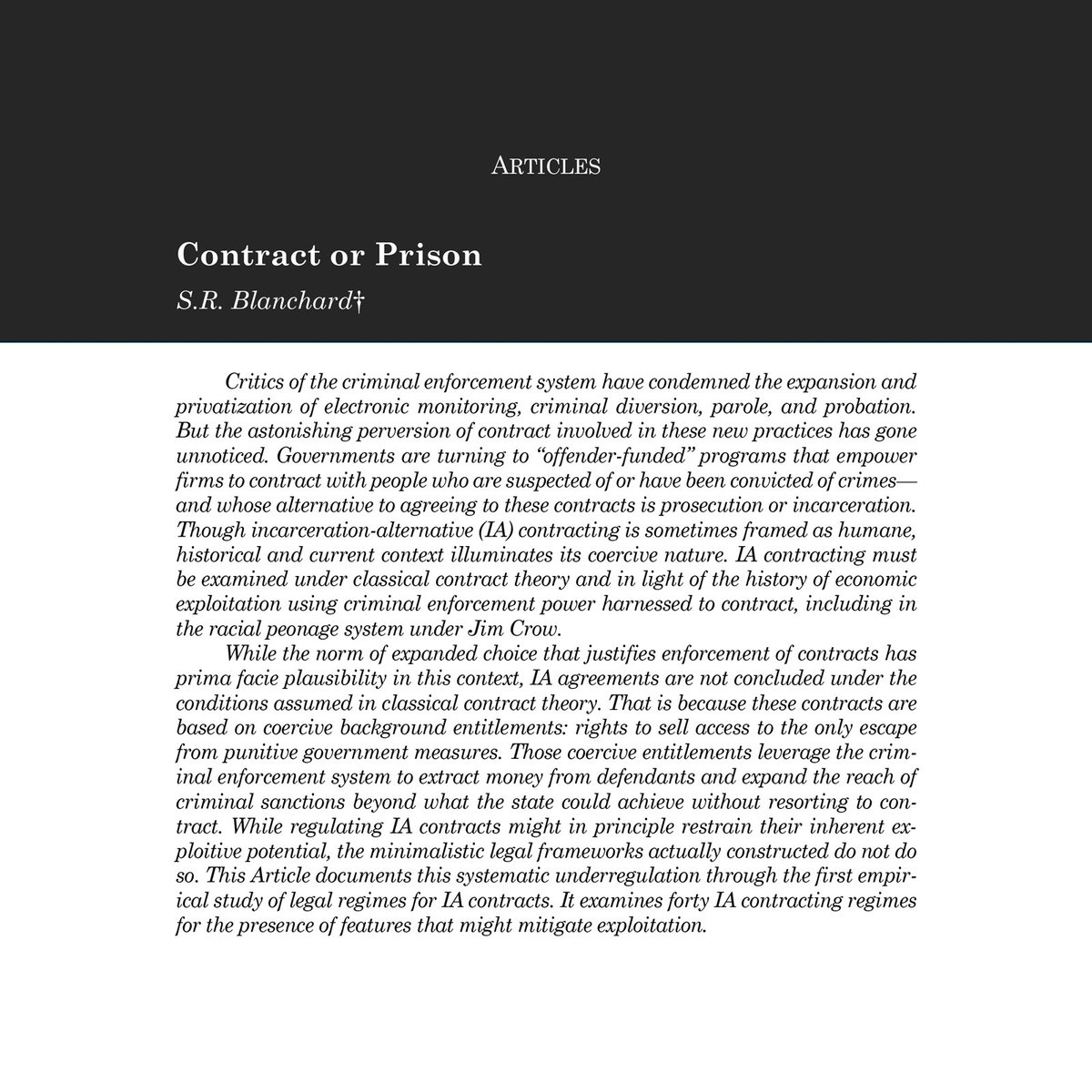
UChicago Law Review
@UChiLRev
Followers
12K
Following
749
Media
254
Statuses
1K
The University of Chicago Law Review is a journal of legal scholarship edited by students of The University of Chicago Law School.
Chicago, IL
Joined January 2012
@prof_blanchard Margaret Schaack examines the latest development in class actions, the “future stakes settlement,” and recommends additional judicial standards to supplement FRCP 23(e) to handle the high degree of risk and moral complexity associated with such agreements.
0
0
0
@prof_blanchard Elijah Greisz reveals the empirical shortcomings of how states are presently regulating data brokers, arguing that more should follow the lead of California’s Delete Act.
0
0
0
@prof_blanchard Hana Ferrero analyzes a recent defendant-friendly shift in litigation under Illinois’s Biometric Information Privacy Act and proposes a framework courts can use to determine whether a given biometric identifier falls under the statute’s reach.
0
0
0
@prof_blanchard @prof_blanchard examines “offender-funded” alternatives to incarceration and argues that coercive contracts—offered under threat of jail—extend state power and extract wealth from defendants, all while evading meaningful legal regulation.
0
0
2
Volume 92.4 is now live, featuring one Article by @prof_blanchard; one Article by Nikhil Menezes & David E. Pozen; and three Comments by Hana Ferrero, Elijah Greisz, and Margaret Schaack. You can find them all here:
5
4
9
@conorjclarke @michaelcpollack @mtokson @adri_robertson Aziz Huq reviews three major works mapping the geopolitical dynamics of digital regulation. He argues that U.S.–China rivalry limits global regulatory convergence and urges modest ambitions for a unified digital governance regime.
0
1
2
@conorjclarke @michaelcpollack @mtokson @adri_robertson Adriana Z. Robertson, Pat Akey & Mikhail Simutin show how retroactive changes to Fama-French factor data can decisively shape legal valuations and event studies—highlighting concerns over reliability, the "law of conservation of judgment," and academic-commercial entanglements.
1
1
1
@conorjclarke @michaelcpollack @mtokson @adri_robertson Michael C. Pollack (@michaelcpollack) & Matthew Tokson (@mtokson) expose the flaws of property-centered Fourth Amendment law, showing how it can be manipulated, exclude digital privacy, and leave society’s most disadvantaged with the least protection.
0
3
9
@conorjclarke @michaelcpollack @mtokson @adri_robertson Conor Clarke (@conorjclarke) & Henry Hansmann examine the rise of special-purpose governments—single-service entities that blur the line between public and private. They offer a new framework and suggest reforms to help these overlooked bodies fulfill their potential.
0
1
2
Volume 92.3 is now live, featuring pieces by @conorjclarke & Henry Hansmann; @michaelcpollack & @mtokson; @adri_robertson, Pat Akey & Mikhail Simutin; and Aziz Huq. You can find them all here:
5
9
10
Thank you to the panel moderators: Joe Schottenfeld (What Is Distinctive About LPE and L&E?), @AriGlogower (Markets & Inequality), and @glakier (Applying the Different Approaches of LPE and L&E).
0
0
0
Thank you to the panelists: @akapczynski, @j_simonson, Adam Davidson, @adamschilton, @Maceyjoshua, @VersteegMila, Sarath Sanga, @sanjuktampaul, @ErikHovenkamp, @jacobsgoldin, @ZLiscow, Amy Cohen, Jonathan Klick, @itshajinkim, Kristin Underhill, and Kevin Tobia.
0
1
3
Today, we are hosting the 2025 Law Review Symposium: Law & Economics vs. Law & Political Economy: A Debate.
law.uchicago.edu
2
2
10
@ZaringDavid posits that the Roberts Court’s willingness to revisit everything in the admin law context but resist change in the securities regulation context can be explained by its interest in policing public rights, but not in reformulating the standards for private disputes.
0
0
1
@ProfYYadav1 and Joshua Younger analyze the introduction of mandatory central clearing for most trades in U.S. Treasuries and detail its likely advantages and its potential trade-offs from a public policy perspective.
1
0
1
@CParaSkinner discusses four areas where financial stability or systemic risk mandates have empowered bank regulators and supervisors to substitute their judgment for that of Congress.
1
0
0
@STOmarova and Brian Richardson argue that only by considering the unique objectives and tools of public investment as a legitimate sovereign activity can we design workable mechanisms of democratic accountability for public-investment institutions.
1
0
0

















